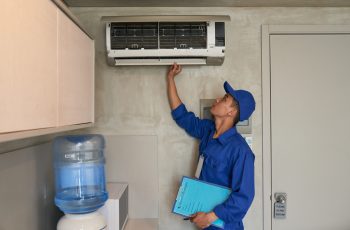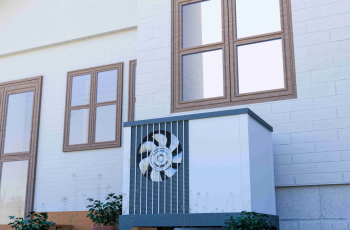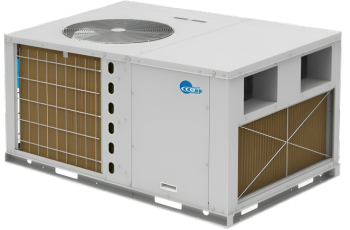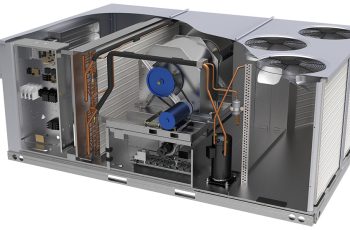Packaged rooftop units, often referred to as rooftop HVAC systems or RTUs, are self-contained heating, ventilation, and air conditioning (HVAC) systems that are installed on the roof of commercial or industrial buildings. These units are designed to provide efficient climate control for large spaces, offering both heating and cooling capabilities. Packaged rooftop units are common in commercial buildings, retail spaces, offices, and other applications where centralized HVAC systems are needed.
The installation of a packaged rooftop unit (RTU) for heating, ventilation, and air conditioning (HVAC) in commercial or industrial buildings offers several benefits:
Packaged rooftop units are installed on the roof, freeing up valuable indoor space for other purposes. This is particularly advantageous for commercial buildings where interior space is at a premium.
Packaged units come as self-contained systems, simplifying the installation process. The all-in-one design includes heating, cooling, ventilation, and controls within a single unit, reducing the complexity of the installation compared to split systems.
Placing the HVAC system on the roof provides easy access for maintenance and servicing. Technicians can perform routine inspections, repairs, and replacements without disrupting the daily activities inside the building.
Packaged rooftop units are available in a variety of sizes and capacities, allowing for flexibility in meeting the specific heating and cooling requirements of different buildings. This makes them suitable for a wide range of commercial applications.
Ventilation and Indoor Air Quality:
Scalability:
Centralized Control:
Cost-Effective Solution:
Reduced Noise Levels:
Contact the Usa ProService Inc company to schedule a service call. Be prepared to provide help about the problem.
Get a QuoteRegular maintenance of packaged rooftop units (RTUs) is crucial for several reasons, ensuring optimal performance, efficiency, and longevity of the HVAC system.

Regular maintenance involves cleaning, inspecting, and tuning the components of the packaged rooftop unit. This optimization ensures that the system operates at peak efficiency, delivering consistent heating and cooling performance while minimizing energy consumption.

An efficiently operating HVAC system consumes less energy. Regular maintenance helps prevent issues such as dirty filters, clogged coils, or malfunctioning components that can lead to increased energy consumption. This, in turn, results in lower utility bills and reduced environmental impact.

Routine maintenance allows HVAC technicians to identify and address potential issues before they escalate into major problems. By detecting and addressing minor issues early, the need for costly repairs and unexpected breakdowns is significantly reduced.

Proper maintenance contributes to the extended lifespan of the packaged rooftop unit. Regular inspections, lubrication, and cleaning help prevent premature wear and tear on components, reducing the likelihood of system failures and the need for early replacements.

"MR Pro Service The modular design of the rooftop unit allows for scalability and flexibility. It's an excellent solution for commercial spaces with varying heating and cooling needs. The ability to add or remove modules based on demand is a game-changer.

The high-efficiency HVAC system in this Packaged Rooftop Unit is a standout feature. It provides powerful heating and cooling capabilities while keeping energy consumption at a minimum. The SEER and EER ratings are impressive, contributing to cost savings

"MR Pro Service The smart controls and integration capabilities are a technological marvel. The unit seamlessly integrates with my building management system, allowing for centralized control and monitoring. The intuitive controls make it easy to customize settings for optimal comfort.

The inclusion of Energy Recovery Ventilation is a forward-thinking feature. It enhances indoor air quality by exchanging stale air with fresh outdoor air while recovering energy from the exhaust air. It's a holistic approach to maintaining a healthy indoor environment.

The high-efficiency HVAC system has resulted in noticeable energy cost savings. I've seen a reduction in monthly utility bills without compromising on the comfort of the indoor environment. It's a win-win for both efficiency and cost-effectiveness.